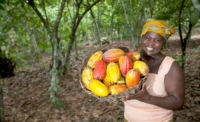Nestlé has eliminated 44% of its waste per ton of product since 2010 in the U.S., and five factory locations reached zero waste to landfill status by the end of 2013, according to its new sustainability report.
The Creating Shared Value (CSV) report is the company’s first expanded effort to highlight U.S.-specific milestones and achievements linked to Nestlé’s global sustainability principles and commitments. The report lists the food giant’s nutritional, social and environmental progress from the past year, as well as provides updates on the company’s U.S. progress toward its global commitments.
Other notable environmental impact updates include saving more than 3.3 billion lbs. of plastic since 2003 by reducing the plastic content of its PET half-liter water bottles by 60%. It’s already on its way to achieving zero waste in Europe by 2020.
For the supply chain, last year Nestlé says it achieved its goal of sourcing 100% Roundtable on Sustainable Palm Oil (RSPO)-certified palm oil. The company also implemented Responsible Sourcing Guidelines for seafood that align with its global Responsible Sourcing Guidelines, working with experts to track suppliers and contribute to healthier ecosystems. In 2013, Nestlé committed to sourcing 100%-certified cocoa beans for its Crunch Bars.
Regarding mounting health concerns in the U.S., the company has launched new portion guidance tools and an educational campaign called Balance Your Plate to help consumers build nutritious and convenient meals that meet the Dietary Guidelines for Americans. The company also reduced sodium in many of its most popular brands, such as Stouffer’s and DiGiorno, and committed to further reduce sodium content by 10% in products that do not meet the Nestlé Nutritional Foundation criteria by the end of 2016.
Source: www.sustainablebrands.com




